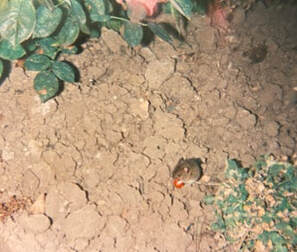| I collected anything when I was younger: thimbles, stamps, things with Mr Blobby emblazoned on them, beanie babies. If things came in a set, I was there. ‘Collecting’ or taking photographs didn’t start out as an intention of mine, but when I began taking photographs, I realised I wanted a document or record of everything I was experiencing. My first real photographic experience was an excellent photo of a mouse that I took when I was a child. I don’t remember taking it, but my maternal grandmother (Nanny) told me the tale time and time again of me in her garden, crouched down with a 35mm point and shoot camera and the mouse photograph came from that roll of film. |
The photographic education I received was mixed, mostly because I wasn’t a brilliant student. Studying A-level Photography was the key to developing my knowledge of genre, technique and image analysis. I had no breakthrough moment, no big ideas and I still wasn’t sure if it was something I wanted to pursue beyond school. Like most 17-year olds, I was pretty lost. I’m glad of this experience now as a teacher because I can empathise with students’ struggles.
I fell into photography as a degree choice and decided to combine it with psychology at a middle of the road university. I received no help with UCAS and, coming from a small seaside town, it was an unwritten rule that we had to leave quickly or resign ourselves to being there forever. I chose the former, rushed my university options and attended no open days. Despite not having flashy facilities, or being top of the league table, we were given the bones of an excellent photographic education - we were taught to stop and look. Tom Wood was one of my visiting tutors and, after a gruelling group critique, he invited me on a shoot in North Wales. He turned up to the shoot with 3 decorators’ lamps and camera kit in a Tesco trolley. He doesn’t drive, so seeing him lugging this kit with him to a student charity shop photoshoot really helped me pay attention. He took every moment of every shoot as seriously as the last and placed no more or less value on this day despite the grim weather. I was full of admiration for this. Gobsmacked in fact. It was there and then I started to take my work much more seriously. He spoke to me at length about my degree project, a study of my grandmother. I read in an article recently that photography students often focus on safe spaces or stories before trying out their skills on unfamiliar subjects. This is what I did. I lacked confidence and was dragging my heels. Tom Wood said, “She won’t be here forever”. With that, photography became my obsession.
I adore photobooks. Currently, I love Stephen Gill’s books. I attended his excellent talk at Martin Parr’s BOP festival in Bristol. It helped me understand his process. The Pillar was a Christmas addition to my growing library and is as valuable to me as Tom Wood turning up with his trolley. I feel photography departments should all have a copy of Nan Goldin’s Ballad of Sexual Dependency. Students are always in awe of Goldin’s images when they are first introduced to her work. It means so much more to them seeing it in a book than on screen, although it’s good to remind them that the project started life as a slideshow with music! Photobooks always inspire students. Choices about types of paper, scale and binding help students see that photobooks can be a vehicle for delivering their visual stories.
I don’t see as many photography exhibitions as I would like to. The last one that I really enjoyed was last year’s Format Festival in Derby. I enjoy a group exhibition much more than a solo exhibition. I enjoy thinking about curators’ choices, how context affects the meaning of photographs. Craig Easton’s Sixteen was poignant and benefited from an unusual location. It screamed first job, first social experiences, first memories as a teenager. Seeing the work of Kensuke Koike at Format helped me get a stuck student out of a rut. I approach exhibitions as both a photographer and a teacher. I am thoroughly looking forward to seeing Hannah Starkey at the Hepworth Gallery.
I feel that students get the most inspiration from looking at physical books and photographs, seeing work in exhibitions and experiencing life. However many Pinterest boards they look at, however many photographers I give them, the most powerful influence is often something they’ve discovered, seen or been through themselves. I highly recommend students listen to Ben Smith’s A Small Voice podcast. I discovered it last year and it has really helped fill a gap. The process and experience of a photographer making work is something I spend a lot of time thinking about. Hearing them talk candidly for an hour with brilliant host Ben is particularly refreshing. I often have it on in the background during A-level lessons. The best thing about discovering it late is that I have so many back episodes to get through! The Daniel Meadows episode was an enjoyable listen, as was Ian Weldon’s. The Photographer’s Playbook is a brilliant resource for students who want to expand their practice, but it works equally as well for students who have no ideas and for me when I’m short on ideas for assignments. Photography magazines are a widely overlooked resource too. They combine the fresh practitioner perspectives and thematic curation with tactile presentation and decision making. I subscribe to British Journal of Photography, Foam, and Source but there are dozens more.
Carving out research in photographic education is difficult. There isn’t a whole lot out there but I knew I wanted to contribute my own work to the field. I originally started a practice-based PhD exploring themes of domestic representation in family albums, but quickly became lonely and disenchanted. It was working in schools and colleges that spurred me on. I have taught the subject for eight years now, and it was what I was seeing in the classroom (or not seeing perhaps) that helped me decide to research photography education.
There are no set models for teaching photography and most of what exists is based on art and design practice or historic pedagogies. Photography is so important for students but not only as a standalone subject. Students need to be able to analyse and interpret the imagery they see every day, and photography skills help them do this. Equally, learning how to analyse photographs helps make them better photographers. I am interested in the process of photographic education - what is taught, who is teaching it, what the students are taking photographs of and why. There are several related strands.
For example, a recent paper I have been working on explores the use of photography across the wider curriculum. Another examines the educational backgrounds of the teachers teaching the subject. I plan to work with Source Magazine’s Graduate Photo Online to conduct research into themes and patterns across higher education student work. The collector/obsessive in me wants to know everything, so a doctorate helps to placate this need.
As a teacher of photography, I notice daily what students lack in terms of knowledge and skills and this encourages me to try and fill these gaps with my research discoveries. Students sometimes cannot interpret meaning in imagery, even on the simplest level, and it is my belief that this has come from a desensitisation caused by the sheer number of pictures they are exposed to. A new level of visual literacy, or photoliteracy, is needed. It is also my belief that if photographic literacy was embedded properly and thoroughly across the wider curriculum, then it could pave the way for photography teachers to work together to build a strong and suitable model that suits both the needs of the wider education field and most importantly, photography students.


 RSS Feed
RSS Feed